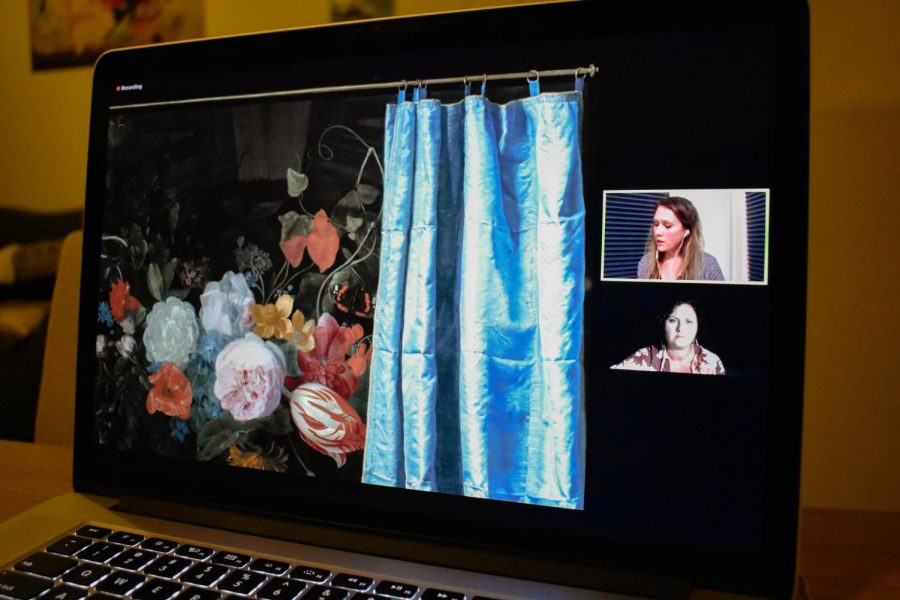Authors Caryl Pagel and Lauren Shapiro speak on themes in their latest works at Prairie Lights reading
Authors Caryl Pagel and Lauren Shapiro read work and spoke virtually on Friday night about their grief, memories, humor in writing, and their latest books.
Poet Caryl Pagel reads an excerpt from “Out of Nowhere Into Nothing” at a virtual Prairie Lights reading on Friday, February 26, 2021. Lauren Shaprio also read poetry from her new novel at the reading.
February 27, 2021
Members of the Iowa City community virtually welcomed the Prairie Lights reading experience into their homes on Friday night,
Caryl Pagel, author of Out of Nowhere Into Nothing, spoke with Arena author Lauren Shapiro about their latest works published in 2020.
Pagel read an excerpt from her book, titled “Wild America,” that took place in Iowa City on a walk between Basta and Marvin Bell’s house, where she stayed at the time.
The essay was a combination of a “fragmented recollection,” as the essay states, a friend’s prediction of someone’s cancer, and a paranormal connection story.
“Wild America” actually took place during a night hanging out with friends, drinking wine at Basta, where the storytelling fell into a tragic topic. Pagel stated that was not out of the ordinary for her group of friends.
RELATED: Iowa City authors speak on historical fiction novel about Mary Shelley
Coated with details like “syrupy eyes” and a connection between souls via the word pineapple, Pagel narrated her memory eloquently.
The essay’s title, “Wild America,” originated from a Marty Stouffer PBS wildlife show, which Pagel explained made her feel stuck in the repetition Stouffer introduced himself with on the show. She utilized that concept in her essay.
“I will not pretend to recall the exact instance that Marty Stouffer’s voice imprisoned me, nor can I say that every viewer would respond in a similar fashion, but I can testify that this sufferance of self occurred,” Pagel said.
While she read, her screen displayed old Victorian-esque still-lifes of fruit, skulls, and varying shapes. Most of the images, she said, were quite random.
“This is one of the most fun parts of having published this book and doing all the things that one does after you publish, like readings and going to classes. All of that stuff is getting to think about the images in a new way,” Pagel said.
Pagel took photos that weren’t from the book and showed them while she read. She commented that during the publication process, she cut about half of the images intended for the book.
Images remained a topic of fascination throughout the reading for the authors and viewers alike. A question during the Q&A portion of the night inquired about both authors’ use of images in their work and writing process.
Shapiro read a plethora of poems from her book, showcasing black and white images from the collection, as well. Her most notable images were those of an arena, which she took at a Metallica concert she attended solo.
“I was interested in investigating the idea of panic,” Shapiro said. “It’s hard to write panic because it’s something you feel immediately and writing takes so long. So, I was looking to images particularly of arenas as a way to create that feeling of claustrophobia and being stuck.”
Pagel inquired of Shapiro what the concept of arenas meant to her now in 2021 when most arenas are empty.
“I was worried about a lot of things about the pandemic, the book being the least of my worries obviously. But then I started to think of all these other ways that the arena is sort of signifying now,” Shapiro said. “Maybe it’s amplified — the same concept but it’s just much more terrifying to everybody now.”
Shapiro’s poems touched on themes of grief in a melodic and humorous way. Pagel commented that while it’s a dark type of humor, she still finds the book funny.
Shapiro explained that in her mind, humor is both a tool that keeps a distance in writing but also allows for exploration.
Lines like “I wondered how long I would be on fire,” “the only reason you know it’s over are because of the cheers,” and “hear the symphony eulogize him” were only some of the lines that showcased the heart-wrenching emotion in the poems.
Both Pagel and Shapiro drew the reading to a close by discussing their writing processes.
Shapiro described her process as the length of the cup of coffee she gets in the morning before her children wake up. With her small amount of time, she explained that she’s just begun typing instead of writing longhand. Pagel laughed and said she did not have much of a process.
The reading concluded with a semi-joking request from Pagel.
“I have a lot of beginnings to things, and I really struggle to take the thing whether it’s a poem or an essay, from the first part of the project into really turning into a thing to work on until it’s done. I have all these beginnings, so if anyone has any advice, feel free to get in touch,” Pagel said.














